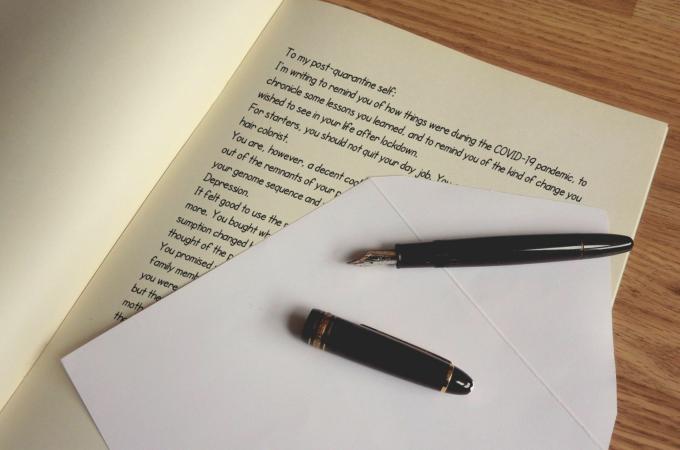Letter to my post-quarantine self
To my post-quarantine self:
I'm writing to remind you of how things were during the COVID-19 pandemic, to chronicle some lessons you learned, and to remind you of the kind of change you wished to see in your life after lockdown.
For starters, you should not quit your day job. You are neither a good barber nor hair colorist.
You are, however, a decent cook. You learned to make flavorful, satisfying meals out of the remnants of your pantry, drawing upon the "Italian peasant" part of your genome sequence and your grandparents' legacy of living through the Great Depression.
It felt good to use the produce, canned goods and spices you had before buying more. You bought what was available, not what you craved. Your habits of consumption changed because of scarcity and limited windows of time to shop. You thought of the poor each time you sat down to eat, and you prayed for them.
You promised not to take for granted the opportunity to sit face-to-face with family members and friends, and you committed to putting away your phone when you were with them. Zoom and FaceTime were cheap imitations of the real thing, but they did foster connection when you needed it. You checked in on your grandmother more often and you made it a point to reach out to your single friends and those you knew who were lonely.
You swore off judging anyone else's parenting style (egregious and abusive behavior aside). You swapped stories with fellow parents of what it was like to be on video conference calls while holding a teething baby, worry about putting food on the table, navigate digital platforms to download your children's homework, and make your home function as a school, office, gym, playground and cafeteria without any set change or intermission.
There was a lot more solidarity between stay-at-home moms, working moms and work-from-home moms -- and dads, too. You thought that single parents and caregivers should have their canonization causes opened now. No need to wait for a posthumous examination.
You finally understood what the term "domestic church" meant and lived your Catholicism very locally. You created little altars and spaces for prayer in your new home parish and decided that even when you could receive Communion again, you would keep making spiritual ones.
You thought often of the people you encountered on your mission trip to Guatemala who received the Eucharist once a year at most, and how joyful -- and loud -- their celebration was when the priest arrived in their village to offer that one Mass. You picked up the Bible more (and even read it!).
Some days were slow and some days flew by. You noticed your infant son's hair come in a little more each day and understood how God could in fact number the hairs on our heads. Sustained, careful attention turned out to be quite important.
You tried to keep a rhythm to your life: The Sabbath was for leisure while the rest of the week was for the circus. It was important to dress smartly for Mass and for holidays, to mark birthdays and feast days, to send cards and letters. You made sure to thank the ordinary heroes who were risking themselves for their families and the common good.
You smiled at people six feet away from you on your walks and when you had to wear a mask, you waved instead. You thought more intentionally about what it meant to love your neighbor. You stopped reading news after the dinner hour because it was too hard and the statistics were oppressive.
You were grateful for a reprieve from the culture wars and incessant political coverage, especially in an election year. You were sad the abortion clinics stayed open but grateful that the elderly, disabled and infirm got their due. You were hopeful that people would extend that radical solidarity to pregnant women and children in time.
You made lists of places you wanted to show your son when you could travel again: national parks, New York City and St. Peter's Square. The latter two gained even more meaning and historical significance during this period.
It was a time of great anxiety, but hope was more prevalent. It was a time of darkness, but springtime -- and Easter -- eventually came.
- Elise Italiano Ureneck, associate director of the Center for the Church in the 21st Century at Boston College, writes the "Finding God in All Things" column for Catholic News Service.



















